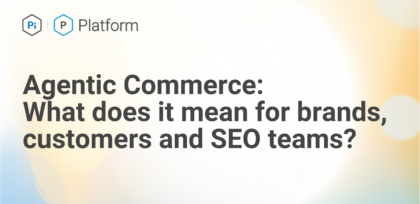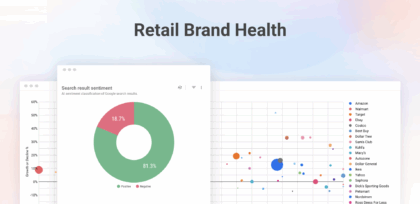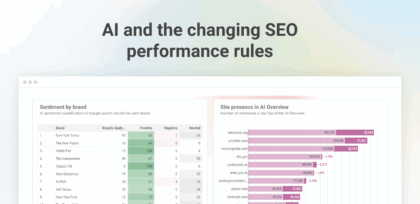BARD, ChatGPT, AI and the future of search
21 Feb 2023|7 MIN READ
For the past several weeks, there has been an enormous amount of chatter, mixed messages, and a fair degree of panic in the SEO community about ChatGPT, Google’s BARD, and Microsoft’s AI-powered Bing as well as its Edge browser.
How will this change search behaviour? What about AI-generated content? How does all this work alongside E-E-A-T? What about paid search? Is this a giant leap toward a zero-click SERP with Google and Bing serving up answers gathered from multiple sources meaning nobody needs to visit a site to read content unless you’re engaging in a transactional, rather than informational search?
This post hopes to set the record a little straighter. I also predict how organic search (and even paid search) will almost certainly change for the better, in genuinely exciting ways!
AI in search is nothing new
Google has been using it since at least 2015 when it launched RankBrain – a machine learning algorithm, which I like to think of as the original disambiguation engine. RankBrain remains a key component of Google’s Algorithm and was introduced in a move to understand the intent behind queries rather than just relying on keyword matching
Google introduces BERT
In 2019, Google then introduced BERT (or Bidirectional Encoder Representations from Transformers). The same Transformer technology seen in ChatGPT.
BERT is a language model that uses a neural network architecture (Transformers) to better understand the meaning of words in natural language and improve the accuracy of search results.
BERT is different from traditional NLP techniques. It considers the context of words in a sentence, rather than just the words themselves.
Incidentally, after Google launched BERT, we undertook an observational research study, in conjunction with the University of Hertfordshire, into voice search. The study revealed conclusively that longer and more complex (voice) queries almost always result in a more pleasing SERP or result.
There was a direct correlation between query length and respondents’ search results satisfaction scores.
Google stated at the time that BERT was also tasked with reducing results that might shock searchers. This is something that has worried some users of ChatGPT thanks to the ‘hallucinations’ the model can experience when trying to fill in the blanks in the two years since the end of training data.
Google introduces MUM
In 2021, Google introduced MUM or Multitask Unified Model. This is a more advanced version of BERT (1000 times more so, according to Google).
MUM is intended to be able to handle more complex tasks and understand different modalities of information, including text, images, and video.
So, AI in search is nothing new. And let’s not confuse ChatGPT, Open AI’s Chatbot language model, which uses deep learning techniques to understand and generate natural language text, with what Google and Microsoft are planning to do with AI in search.
ChatGPT is never going to replace search. But, Google will be using BARD (built on LaMDA or Language Model for Dialogue Applications). And Bing is using a next-gen AI model (rumoured to be GPT-4) which is, according to Microsoft, more powerful than GPT-3, used by ChatGPT, and customised for search.
Coming up-to-date
Both Google and Bing, in a bid to increase relevance and reduce hallucinations, will be using search tools to find answers before feeding the data back into the respective model. They’ll then use this to compose a fluent, perhaps conversational answer.
ChatGPT, as remarkable as it is, can be both selective as well as out-of-date. Try searching for two competing technologies, both developed after the training period came to an end.
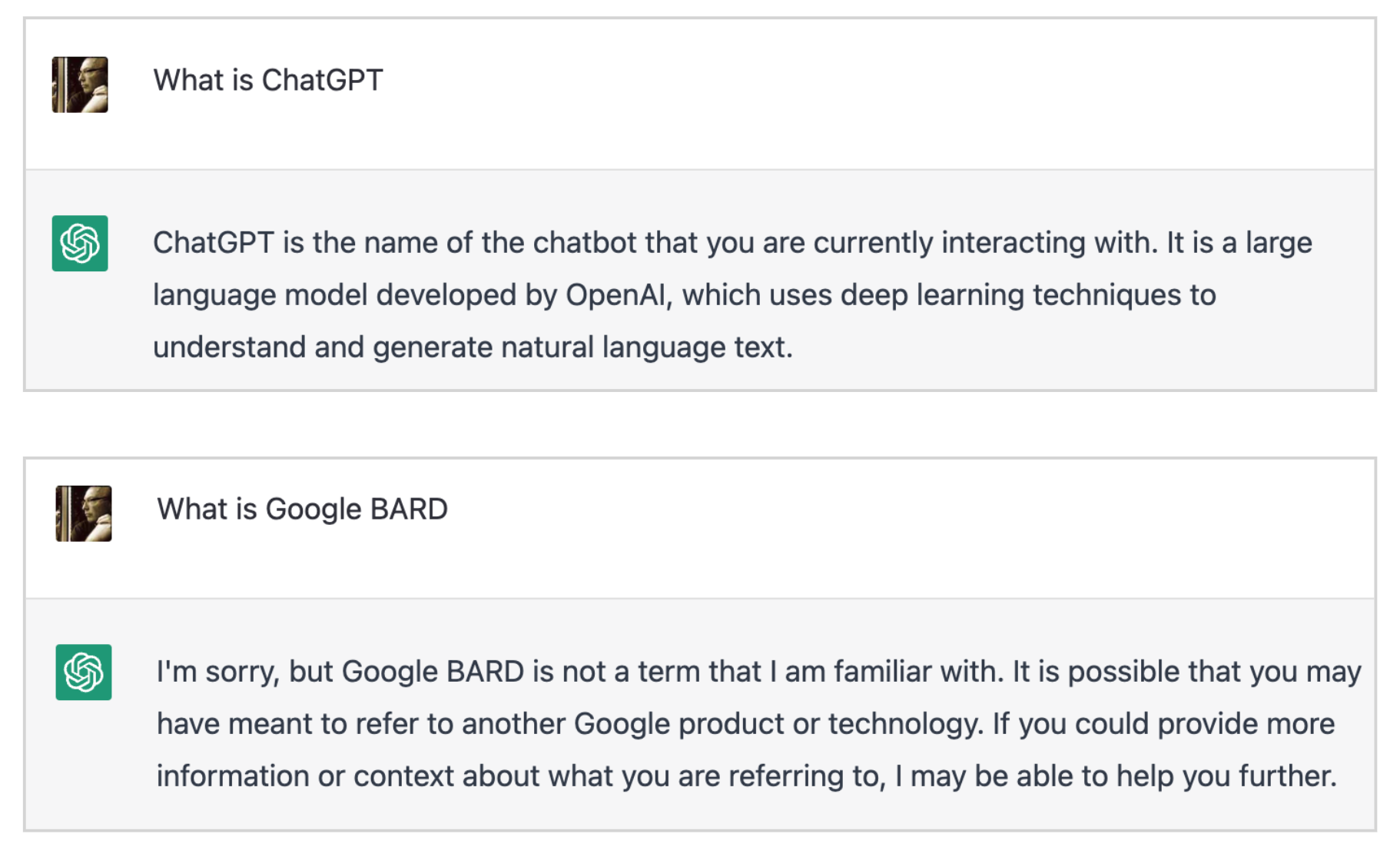
Microsoft did a little gap-filling of their own in the case of that first answer.
How will this impact search?
It’s easiest to start with Bing as Microsoft has already announced and shown off their new AI Side Box:
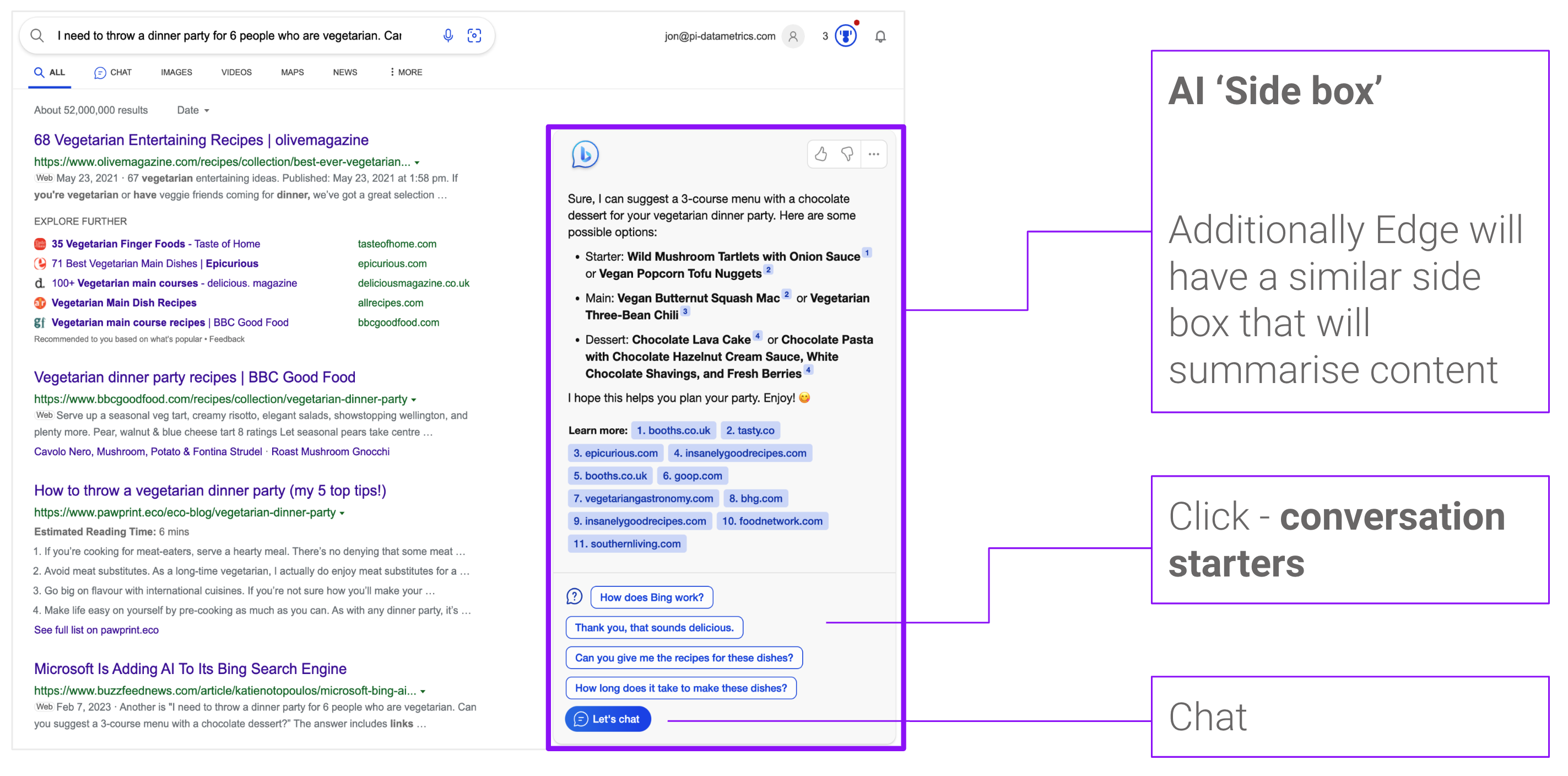 For an informational query, “I need to throw a dinner party for 6 people who are vegetarian. Can you suggest a 3-course menu with a chocolate dessert?”
For an informational query, “I need to throw a dinner party for 6 people who are vegetarian. Can you suggest a 3-course menu with a chocolate dessert?”
This is a pretty impressive result, synthesizing results from several different websites, 11 of which appear (thankfully) to be referenced below the initial answer.
In case you’re not sure what to do next, there are some interactive conversation starters below this with prompts such as “can you give me the recipes for these dishes?” and “how long does it take me to make these dishes?”
Clicking these or the ‘Let’s chat’ button all trigger chat mode (currently only available to selected users) which for informational searches is pretty impressive and super helpful. It’s exactly like having someone do all the research and hard work for you. I’ve always said, while searching is easy, sifting through the results and putting it all together is where the hard work starts.
These results are notably fresher than the results produced by chatGPT. The desserts for example appear to come from a page that was updated in June 2022, well past the training period for the version of chatGPT currently out in the wild.
In the past few days, Microsoft has announced that it is putting a cap on usage of its chatbot. This comes after some users reported disturbing conversations following extended use, including telling one reporter that it wanted to steal nuclear codes.
Google is likely to be doing something similar with BARD. And if the results are as fresh as Bing’s, then we should be witnessing a very interesting battle for the informational search landscape.
What about AI and advertising?
All of this technology however comes at a cost. According to a recent article in the Economist, each chatbot query costs 2c (around seven times the cost of a normal search), so a 10% shift of Google’s answers to AI would cost somewhere between $1bn and $10bn a year.
On top of this, around 80% of Google’s searches, the largely informational ones, return no PPC ads. So how much longer will search engines provide this costly service and chat functionality for free?
The answer to me seems fairly obvious and very exciting! If anything, search engines are going to end up making a lot more money through a different form of advertising.
Starting with PPC – let’s face it – it’s actually quite boring.
For example, I’m searching for Apple’s latest smartwatch (the Ultra)…
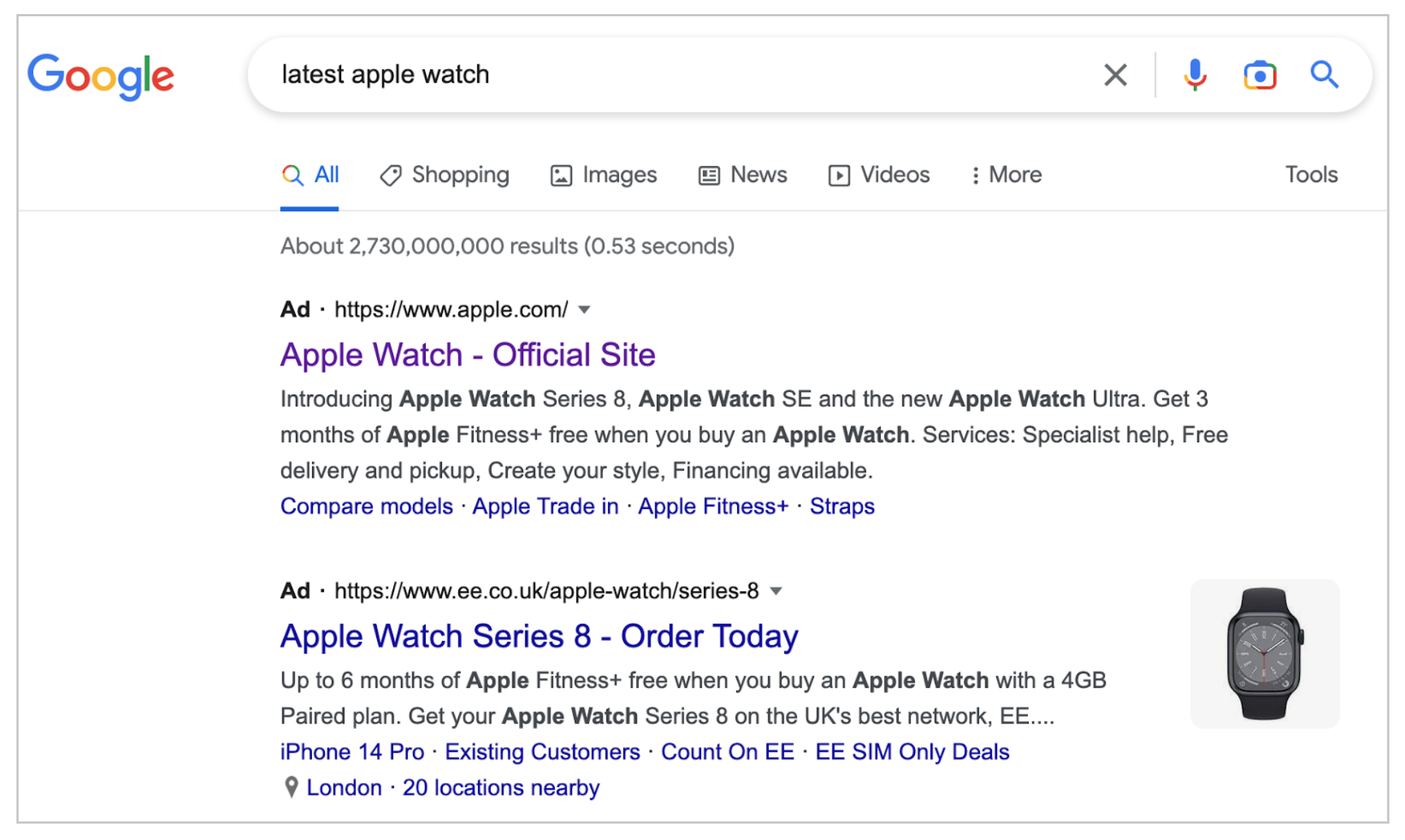
Regardless of the nature of the query, what do these ads tell me about the product? And the dozens of features it has that might tempt me to part with my hard-earned money?
Nothing!
It’s not like walking into a store where I can ask the sales assistant questions about the watch and all of its features and get answers to all of my questions until the point I’m persuaded to part with my cash!
For example:
Only last week it all became clear to me through a chance encounter with a stranger.
This stranger approached me in a cafe to ask me if the watch I was wearing was indeed the new Apple Watch Ultra.
When I enthusiastically told him it was, he proceeded to ask me questions relating to the battery life, the scratch resistance, the waypoint functionality and so on.
During this conversation, as a huge Apple fan, I provided him with all the answers, as well as asking him questions, such as what he might use the waypoint function for; as it turns out it was for camping! Perfect!
After ten minutes we parted ways and I’m pretty confident that this guy is now sporting the same watch. I even advised him which strap would be best, given his lifestyle.
As I walked home, it dawned on me that this was a perfect example of conversational advertising.
He asked questions, I asked questions, and we had a conversation. In doing so, I not only learned what his needs were, but I adapted my answers, as any enthusiast does, to give the best sales pitch in response.
My answers were personalised to him. The conversation was personalised and I drew from my knowledge of the dozens of features, my experience of using the product and everything I’d read to synthesise the conversation.
This was, if you like, a journey from information to a transaction; just like the kind of journey you can go on when you meet a good salesperson who understands your needs. It’s seamless.
Informational, long-form content will remain important
So how might this work in practice and why is our informational, longer-form content suddenly looking more important?
Picture that same search for “latest Apple Watch”.
Now imagine the boring ads being replaced or competing with a much more interesting AI side box that tells you more about the product, includes conversation starters and allows you to chat with an ‘expert’ to help you make up your mind.
Enter conversational advertising! And here is what the process might look like:
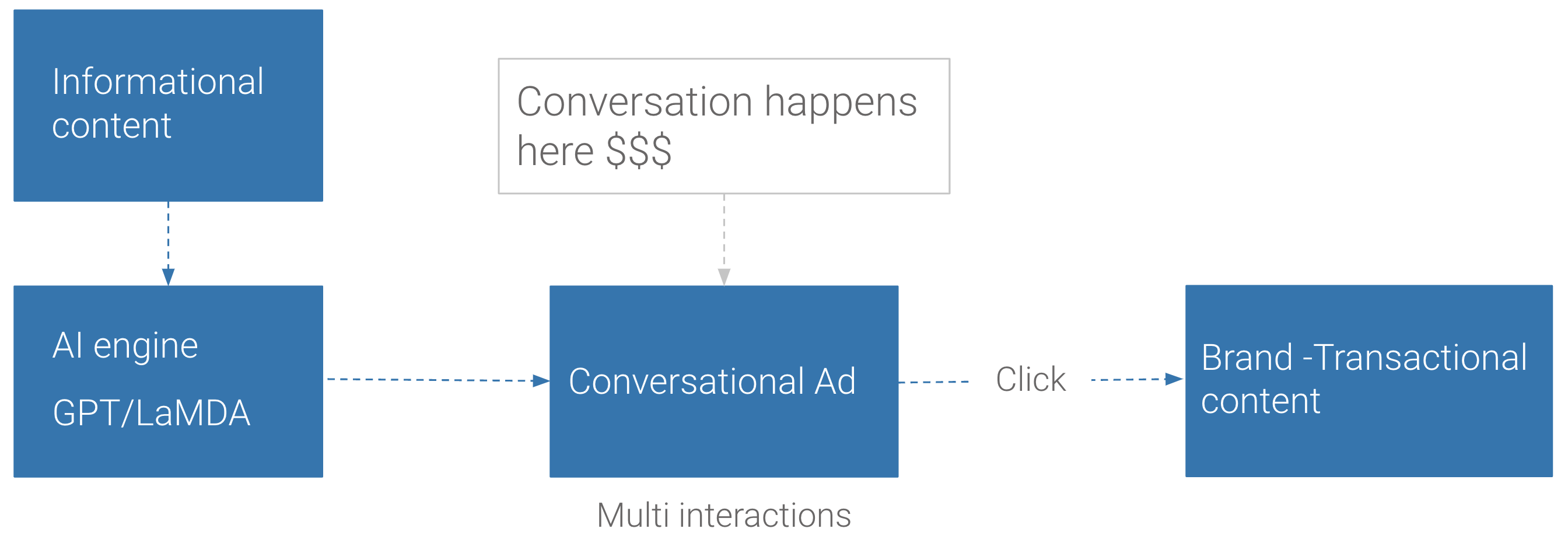
Remember that Google and Bing are feeding up-to-date results (that in Google’s case should meet the well-established quality standards in Double E-A-T as well as the helpful content and product review updates) into their models, so we’re starting with relevant as well as high-quality inputs.
This means that all the wonderful, longer-form, organic content that we’re creating now (and ticking all those algorithmic boxes) will become central to the conversation.
This will take the customer on a highly personalised journey through an AI-powered SERP doorway to a transaction.
The emotional value of search (and AI)
Today’s online shoppers are inundated with choices and according to research carried out in 2021 (Google/Kantar/Quantum, Emotional Value of Search) people experience a wide range of emotions during their buying journey.
From curiosity and confusion to clarity and conviction, people often struggle to find trusted touchpoints that will guide them along the nonlinear customer journey.
What better guide than a personal shopper in the form of an AI who understands the subject matter as well as you and personalises responses beautifully?
The same research revealed that people want to shop with brands that help guide shoppers toward their purchase decisions.
A conversation with an expert (read AI) is far more likely to lead to an emotionally satisfactory resolution.
And what of the cost? Currently, you pay per click and if that trend continues then every conversation will potentially consist of multiple clicks as the dialogue flows back and forth between customer and brand.
Perhaps Google will benefit enormously from multi-click conversational advertising rather than single-click PPC.
So what does all of this mean?
Conversation is the real opportunity
Armed with the knowledge that search engines will be using conversational AI somewhat differently from what we’re used to with off-the-shelf chatGPT (and if Google in particular doesn’t want to make some of the mistakes that Bing’s chatbot has reputedly been making) then I’d put my money on them focussing on Trust and utilising content that ticks all the relevant algorithmic boxes.
So rather than using all the information and data they have available, I see only the most trusted – rather than all indexed (Google is after all an expert in this) – content being fed into the model.
As for conversational advertising, this may necessitate richer content hubs with content that answers all the possible questions that a customer might have (think People Also Ask and beyond).
I’d be thinking about all the touchpoints on the often emotional customer journey. Does your content help the customer obtain an emotional resolution?
I’d venture that a typical PPC landing page doesn’t do this. So it might be good time for paid and organic to start working together more effectively.
Yes, RSA (or responsive search ads) can respond to a query, but just imagine responding to every question that will inevitably follow that query.
Conversation, whether through a paid ad or an organic AI side box, is going to be a real opportunity to empower the customer as they go about their journey of exploration and discovery!
At the latest BrightonSEO, I discussed the Zero Click SERP and how to leverage it to your advantage. if you’re interested in learning more about the importance of zero clicks, download my talk slides and the recording below.
[report-download-cta id=32207 cta_title=”Download now” colour=”jazzberry-jam” icon=”/wp-content/uploads/2018/04/icon-reports.svg” headline=”BrightonSEO slides & recording”][/report-download-cta]
BrightonSEO slides & recording
Never miss a post
Join our mailing list and have our SEO news delivered straight to your inbox.

